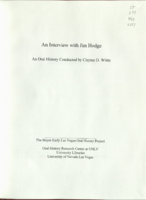Search the Special Collections and Archives Portal
Search Results

Maria Casas interview, June 12, 2019: transcript
Date
Archival Collection
Description
Interviewed by Maribel Estrada Calderón. Farmersville is described as a small town between, Exeter and Visalia, California populated by Mexican American farm workers. It is in this small town, where UNLV History Professor Maria Raquél Casas spent her childhood raised along with her sisters and brothers. In her interview, Dr. Casas describes how growing up in this small town with her traditional Mexican family influenced the person she is today. While working alongside her family in the fields, Dr. Casas decided that she would strive to obtain an education. Through hard work and constant support from her sister, Dr. Casas attended Fresno State, where she discovered her love for history. Upon completing her undergraduate program, Dr. Casas made the decision to further her education by pursuing a master's at Cornell University. At Cornell, she faced discouraging professors who believed she would not be able to complete the master's program let alone pursue a PhD program. Despite these demoralizing professors, Dr. Casas completed her program and was admitted into University of California Santa Barbara's history program. Dr. Casas never forgot her roots or the significance of her presence in the majority white academic spaces she attended during her academic journey. When she arrived at UNLV, she continued to strive for more Latino representation in both the student population and in the school faculty. During her tenure at UNLV, Dr. Casas has served as an advisor for multiple Latino student organizations including MEChA and SoL. Dr. Casas has witnessed much progress in Latino representation at UNLV, but she believes there is still much work left to be accomplished.
Text

Ace Daniels interview, June 2019: transcript
Date
Archival Collection
Description
Interviewed by Monserrath Hernández and Rodrigo Vazquez. Born (1985) and raised in Nevada, Ace is the Senior Conference Sales Manager at Wynn and Encore. His parents immigrated from Dominican Republic and are casino dealers. Ace is a UNLV graduate with degrees in Business and in Theatre Arts. Enthusiastic support of local theatre arts, he is active with the Super Summer Theatre Advisory Board. Married to Raul Daniels.
Text

Abraham Gomez interview, December 6, 2019: transcript
Date
Archival Collection
Description
Interviewed by Elsa Lopez. Abraham Gomez is a College Navigator for the Nevada Treasurer's Office where he is responsible for providing and distributing information on post-secondary resources that may enable Nevadans to go to college. Gomez was born and raised in Las Vegas, Nevada and grew up on the East Side near Desert Pines High School. He received an Associate of Arts from the College of Southern Nevada before obtaining a bachelor's degree in Communication Studies from the University of Nevada, Reno. After graduating he worked as a GEAR UP Ambassador for Nevada State College where he advised a cohort of 46 low-income students on the importance of continuing their education. He has volunteered with various organizations throughout Southern Nevada and continues to work to better his community and make education accessible to students everywhere.
Text

Transcript of interview with Dr. Fiona Kelley by Lisa Gioia-Acres, March 21, 2009
Date
Archival Collection
Description
Dr. Fiona Kelley was born and raised in Connecticut. Her parents were both teachers (though her mother quit teaching to raise their two daughters), and Fiona recalls the European vacations the family took every summer, exploring castles and enjoying picnic lunches. Fiona was educated at Greenwich Academy in Connecticut and Bard College (dance major with art history minor) in New York. She mentions dancing in Acapulco and California and then auditioning and being hired as a cover dancer for Hallelujah Hollywood! at the MGM in Las Vegas. Meanwhile, she had also become licensed in massage and states that as she was making the transition from dancing to production of dance, she and her husband were invited to China. While in China, Dr. Kelley recalls visiting a hospital which specialized in the treatment of AIDS through acupuncture. This led to a decision to learn Oriental medicine, which she pursued once she returned to the United States. She shares many details of her studies
Text

Transcript of interview with Betty Bunch by Joyce Marshall, January 9, 1996, February 7, 1996, & February 13, 2002
Date
Archival Collection
Description
Betty [Rosenthal] Bunch began dancing as a child. By the time she was nine years old she decided she would have a dancing career. At 18 years she began to work in stock theatre productions. Within a short time, she had joined the Moro-Landis dancers. She landed her first job in Las Vegas in 1956 at the Sahara Hotel as part of the opening line for Donald O'Connor. Following the Sahara, she worked as a dancer at the Riveria, and then returned to the Moulin Rouge in Hollywood. In 1961 while vacationing in Las Vegas, she landed a job dancing at the Dunes. She continued to dance, sing and do comedy until after the birth of her second child. At that time, she retired from the Las Vegas showroom, but not from show business. Her involvement in both film and stage has remained rich and varied. This interview focuses on the time Betty spent performing on the Las Vegas strip, including her long involvement with the acclaimed afternoon show Bottoms Up. The interview provides information on workin
Text

Transcript of interview with Mary Ellen Campbell by Ronald Robinson, March 6, 1977
Date
Description
On March 6, 1977, Ronald Robinson interviewed Mary Ellen Campbell (born 1886 in Panaca, Nevada) about her life in Nevada. Campbell first talks about her parents’ move to the United States from England and her own life growing up in Panaca. She also talks about living in Pioche and the conditions of living in these two small Nevada towns. Also present during the interview is Mary’s grandson, Allen Campbell, who sometimes asks a few questions as well.
Text

Transcript of interview with Carl Ciliax by Gary Wood, March 8, 1980
Date
Archival Collection
Description
On March 8, 1980, Gary Wood interviewed Carl Ciliax (born 1941 in Las Vegas, Nevada) about his experiences living in Nevada. Ciliax first describes his family history, his early interests in wildlife, and his background and education in artwork. Ciliax then discusses his early experiences in hunting and his eventual interest in conservationism and preservation, including his involvement with organizations that sought the protection of desert bighorn sheep and the protection of wildlife in general. The two talk more about wildlife, the early development of Las Vegas, and the effects of the atomic testing. The interview concludes with Ciliax’s recollection of recreational activities and some of his thoughts on conservationism.
Text

Transcript of interview with Georgie Clark by Steven E. Pilgram, March 2, 1980
Date
Archival Collection
Description
On March 2, 1980, Steven E. Pilgram interviewed river runner, Georgie Clark (born on November 13, 1910 in Chicago, Illinois) at Sambo’s Coffee Shop in Las Vegas, Nevada. This interview is an in-depth discussion about the Colorado River area, including changes, and new rules and regulations. Georgie also recalls working as a real estate agent and as a ferry command, civil servant in World War II.
Text

Transcript of interview with Jim Hodge by Claytee White, April 13, 2009
Date
Archival Collection
Description
Jim Hodge describes an active and success filled life in this narrative. Born and raised in the South, Jim enlisted in the Navy at the young age of 17, just as World War II was winding down. His primary job was that of a cook. He became smitten with the life of an entertainer after participating in a play and headed for Hollywood in 1952. It was there that he auditioned for Donn Arden, who organized and directed Las Vegas shows. Though he didn't get the part, he did get hired to be a singer for a show featuring Betty Grable. Thus his career was launched and would span the heyday of Las Vegas entertainment from the 1950s to the 1970s. Jim talks about the people, shows and places that touched his life. He also offers thoughts about the changes in the Vegas entertainment scene as well as shares his relationship with his church over the past 40 years.
Text

Transcript of interview with Ruth Annette Mills by Lisa Gioia-Acres, November 20, 2008
Date
Archival Collection
Description
Ruth Annette Mills was born and raised in Washington, D.C. She recalls the early years during WWII, her father's cancer and radium treatment under Blue Cross Blue Shield, his passing when she was nineteen, and her marriage that same year. Ruth and her husband and family lived in Georgia, Texas, and Maryland before coming to Las Vegas in 1968. She worked as a typist for the Office of Education at one point and did volunteer work for her church, the Cub Scouts, and the League of Women Voters. She also worked as a clerk-typist for the Clark County School District, and eventually became a teacher through the Teacher Corps program. She graduated in 1975 and was hired to teach 6th grade at CVT Gilbert. The school integration program was just beginning when Ruth was first hired as a teacher. She held the position of facilitator and recalls how angry parents were when they learned their children had to be bussed to sixth grade centers. Having been involved through her church with the Civil Rights Movement in other states, she was disappointed with the racist attitudes she encountered in Las Vegas. Ruth's involvement with health care began when her daughter-in-law developed kidney stones and was denied treatment. In 1993 she started the Nevada Health Care Reform Project through the League of Women Voters in order to support Bill Clinton's health plan. Fifteen years later, over 100 organizations had come on board to support the League's coalition in favor of Clinton's plan, and her fondest wish is that one day Universal Health Care will be available to all Americans.
Text
